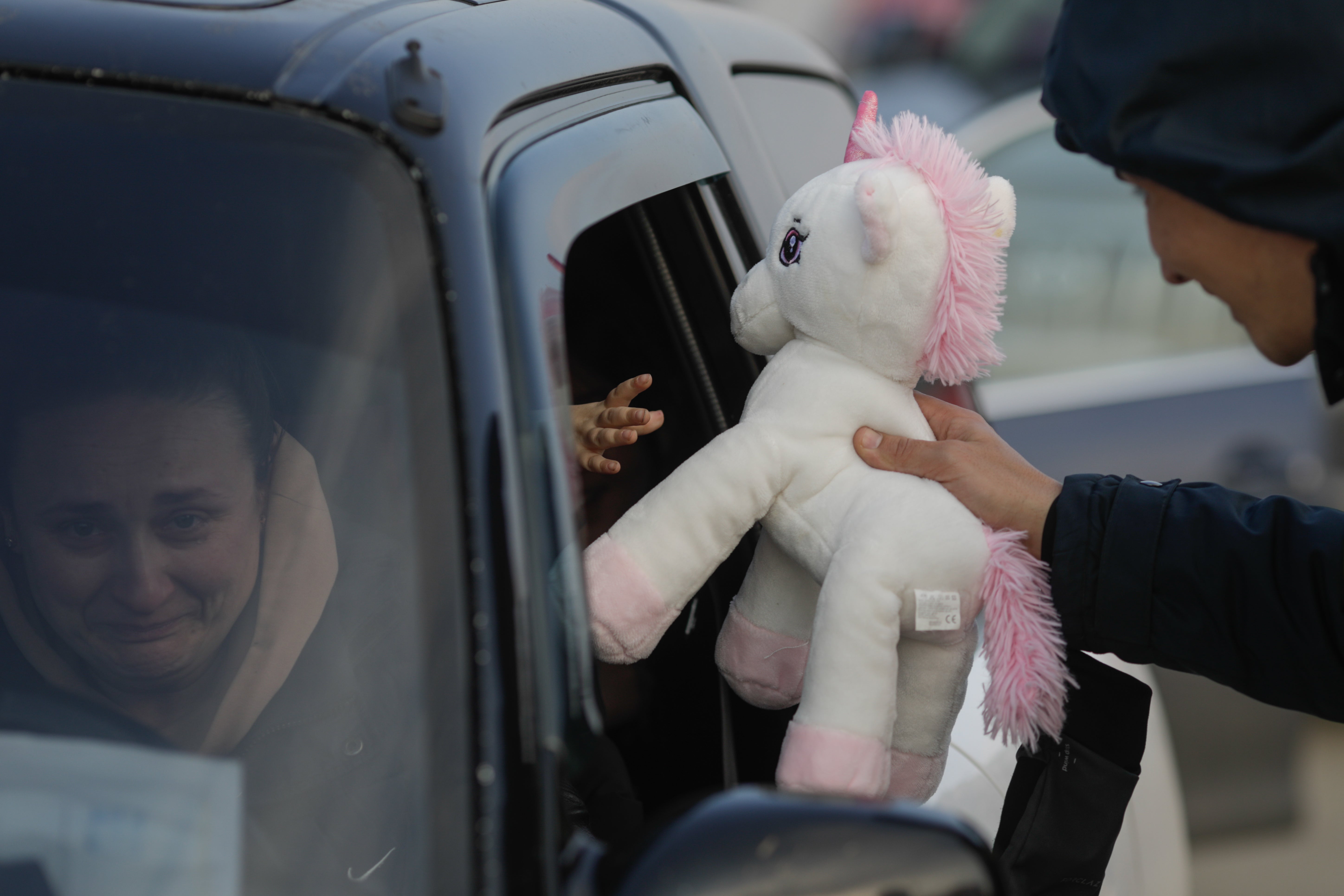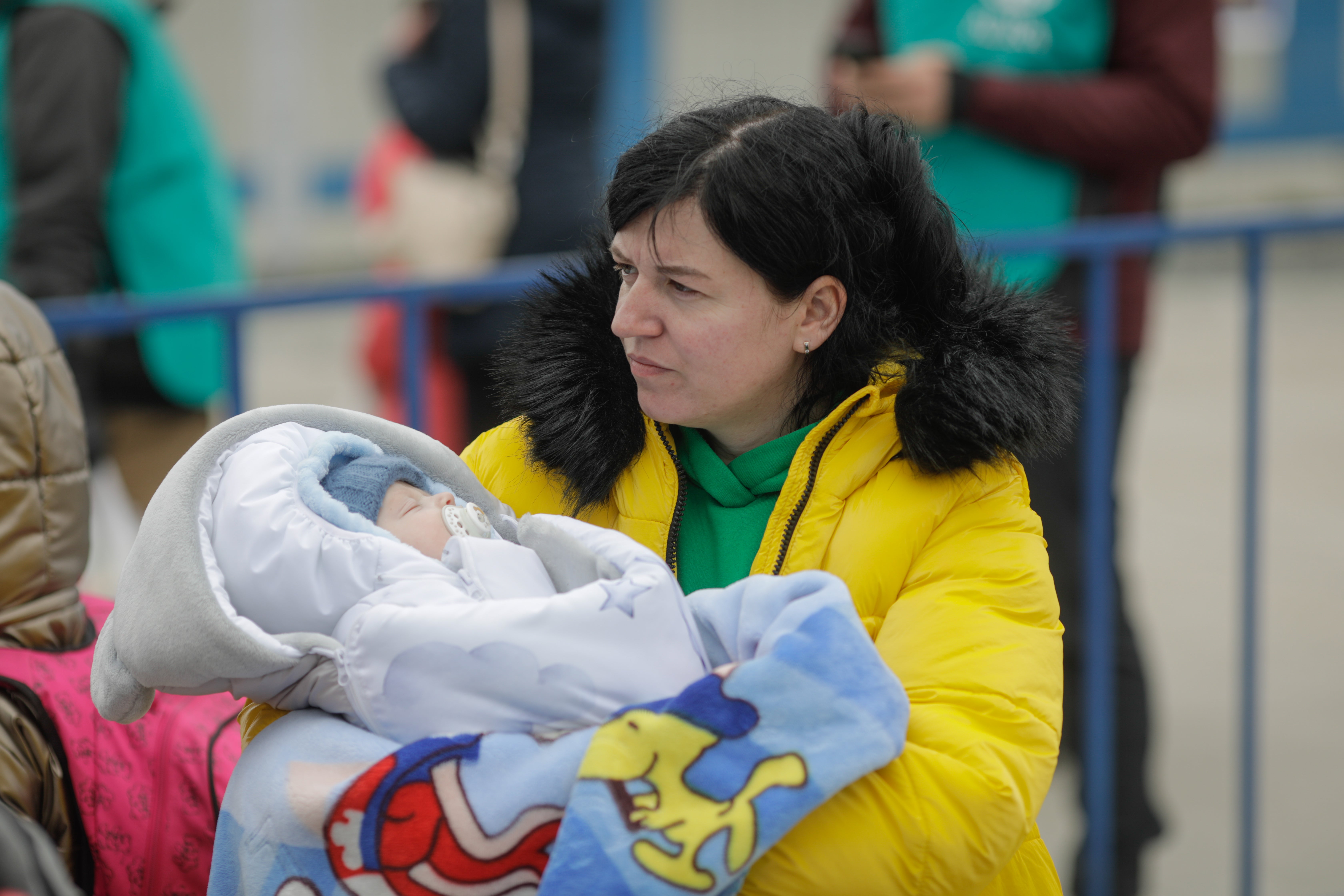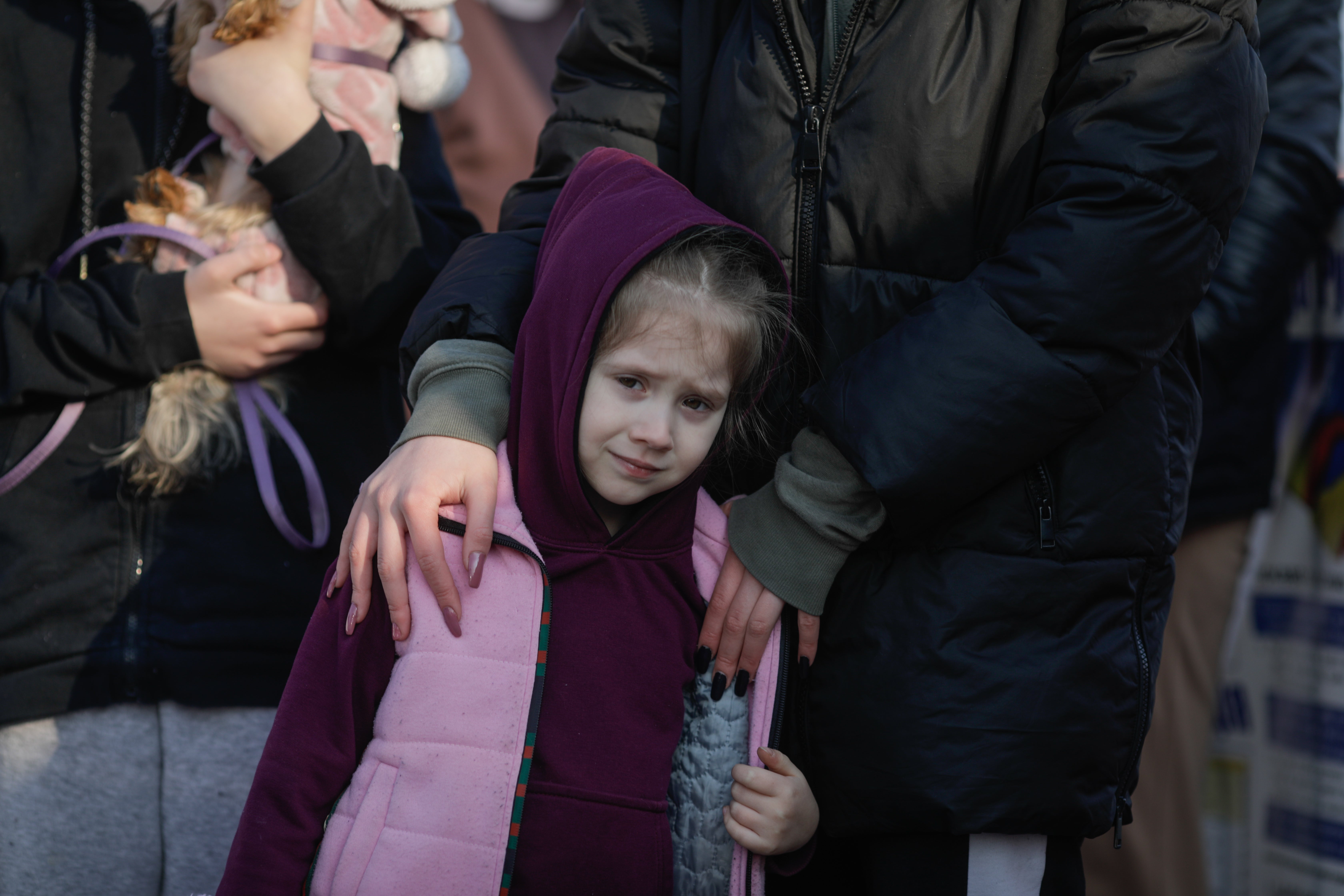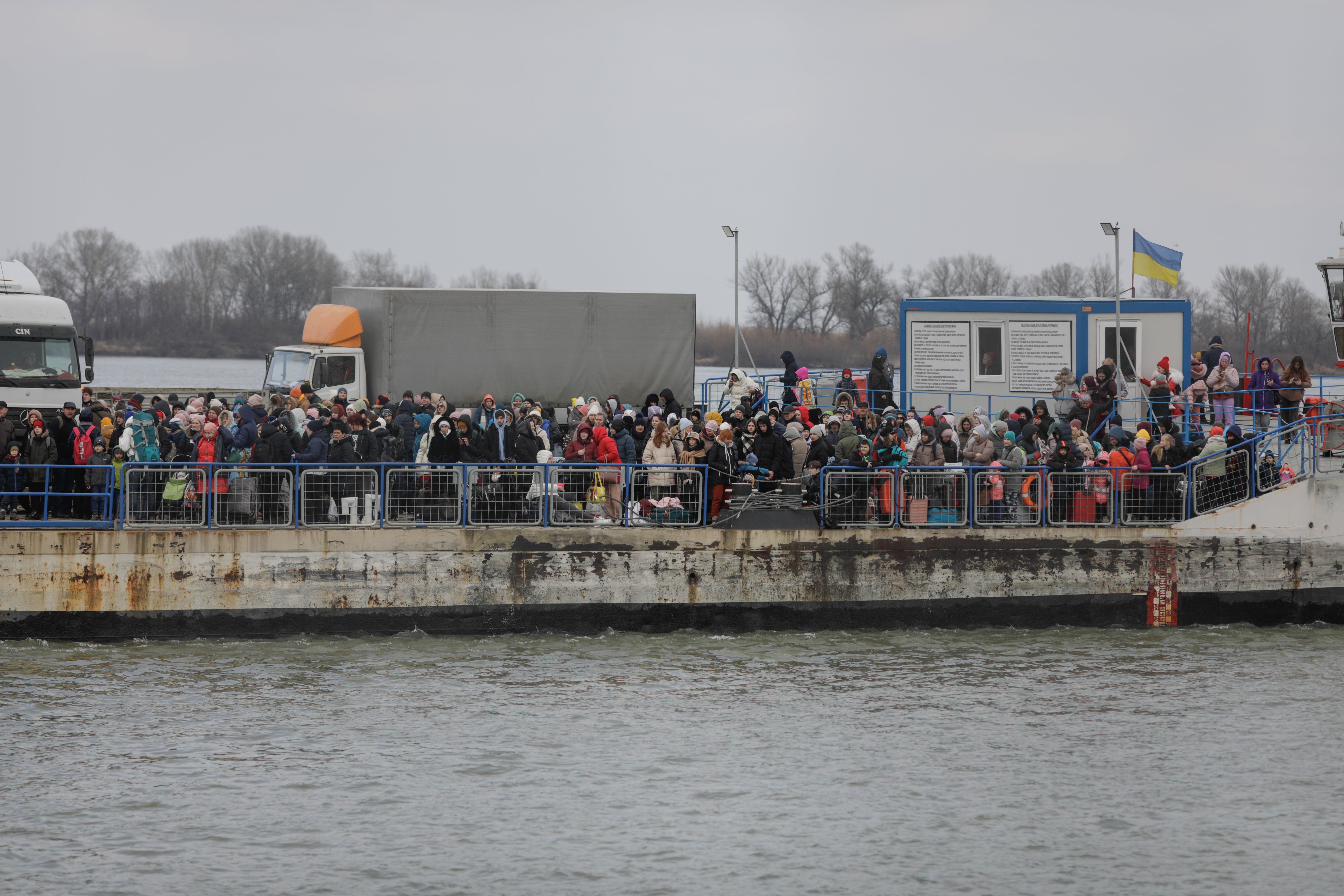‘I was crying so much I wanted to turn back’: Aid workers describe heartbreaking conditions at Ukraine border
Humanitarian organisations are assisting in the crisis in any way possible, with many working in border countries to meet refugees as they arrive, helping with essential provisions. Harriet Hall speaks to Katie Morrison from Plan International about the reality of their experience


Your support helps us to tell the story
From reproductive rights to climate change to Big Tech, The Independent is on the ground when the story is developing. Whether it's investigating the financials of Elon Musk's pro-Trump PAC or producing our latest documentary, 'The A Word', which shines a light on the American women fighting for reproductive rights, we know how important it is to parse out the facts from the messaging.
At such a critical moment in US history, we need reporters on the ground. Your donation allows us to keep sending journalists to speak to both sides of the story.
The Independent is trusted by Americans across the entire political spectrum. And unlike many other quality news outlets, we choose not to lock Americans out of our reporting and analysis with paywalls. We believe quality journalism should be available to everyone, paid for by those who can afford it.
Your support makes all the difference.Daniiel is just two months old. Tucked up in layers of blankets to shield him from the bitter cold, he is balanced in the arms of his mother, Diana, between various belongings. He whimpers and Diana pulls him close, kissing his face, trying to comfort him the only way she can. Diana’s other two children, Julia, five, and Anna, eight, walk alongside her. They are some of the luckier ones. Diana was allowed to leave Ukraine with her husband, and he has joined the family as they cross the border into Romania following an hours-long journey to escape their besieged homeland.
In the first week after Russian president Vladimir Putin commenced his unprovoked invasion of Ukraine on 24 February, the number of people fleeing their homes in the country hit 1 million, according to a tracker from the United Nations High Commissioner for Refugees (UNHCR). By the second week the figure had doubled.
Now three weeks since the invasion, Russian air strikes have targeted key cities including Kyiv, Kharkiv and Mariupol and have reportedly shelled apartment blocks, schools and hospitals, leaving communities displaced and military and civilian casualties mounting.
With martial law in Ukraine decreeing that men aged between 18-60 remain to fight for their country, the vast majority of refugees are women. At least half of them are believed to be children, according to Unicef.
As people flee their jobs, homes and lives, most of them are being welcomed by neighbouring countries. Poland, which borders Ukraine to the west, has taken in more than 1.2 million people and other border states, including Moldova, Hungary and Romania, are also taking in large numbers of refugees.

Katie Morrison is a member of the emergency response team at global children’s charity Plan International. She has been in Romania for the last 10 days meeting refugees at the border. According to Romanian officials, 343,515 Ukrainian citizens have crossed into the country. Katie, along with six of her colleagues, is on what charities call a “rapid needs assessment mission” in the country. Their job is to evaluate the immediate requirements of people fleeing conflict so they can scope out what their response will be, ensuring they can provide the most efficient help and targeting the areas where local organisations are thin on the ground. As well as Romania, Plan International has people in Moldova and Poland. Some of team in the latter are isolating in their hotel having caught Covid on the journey over.
“We’ve been meeting mothers and children as they cross the border – sometimes in a car as they queue to get their papers checked, sometimes on foot and sometimes in tents where they wait and try and stay warm. We’ve also been to a shelter where mums were able to stay for a few nights while they worked out their next steps,” Katie tells the Independent.
Most of the people Katie has met have travelled for four or five days to reach the border, sleeping wherever they can. Some are making their way to countries where they have connections; others aren’t sure where they are going to end up. “Everybody is there,” says Katie. “It’s a bit like if you just took a cross section of 100 people from any city. People coming across [the border] have different levels of means and different professional standings and now they’re all united by this crisis.”
Hundreds of refugees board the open top ferry from the Ukraine side of the Danube River and take the bitterly cold journey across to Isaccea, Romania, near Moldova. Here, they meet volunteers who can offer them hot drinks, sanitary products, and nappies and toys for children, as well as a brief moment to rest. Here, in a long queue to get paperwork checked, is where Katie meets Diana.
At the beginning I was crying so much I wanted to turn back. I dreamed of showing my children Europe, but not like this
Diana and her family travelled from Izmail in the southwest of Ukraine and are planning to travel on to the Czech Republic. Both her and her husband’s parents stayed behind in Ukraine. “As soon as Diana got off the boat, she was given nappies and wipes for Daniiel. She was very happy to have made it to Romania,” Katie says.
But, says Katie – a mother of three young children herself – the practical and physical demands of travelling with young children like this are some of the most emotionally distressing parts of the crisis to witness. “If you’ve got young children you’re used to timing your life within an inch – what you’re doing, when you’re doing it, what you need to bring, when you’re sleeping. These mothers don’t even know where they’re going to sleep and that is weighing on their mind very heavily.
“Then, just the physical reality for walking for days with a two-month-old is really, really hard, especially if you’ve got other children. The logistics of not having enough hands, the fact you can’t put the baby down. It’s very heavy and you’re carrying them for hours. With the added challenge of the bitter cold (temperatures plunged to -10C in Kharkiv this week), “that’s hard for anyone,” she says. “What if you need to change a nappy? I can’t even think of the right word to describe it. It’s just heartbreaking.”

On a train coming back from the Romanian capital Bucharest to the border, Katie meets a 30-year-old woman she refers to as Tana, who withholds her real name for her safety. She is travelling with her parents, her two children (six and 10), her dog and her sister’s cat. Katie says Tana is visibly exhausted, but speaks to her while the children take a brief opportunity to sleep on the seven-hour train journey.
“The most stressful part of the journey was at the start, on the road, after we left Kharkiv,” she tells Katie. Tana and her family drove for four days straight, sleeping on the floor of schools and kindergartens en route. “The children were crying a lot because it was so cold and they didn’t understand what was going on. It was -2 degrees when we got to the border, and we had to wait seven hours to get across.”
Before leaving Ukraine, Tana was an artist for educational resources and hopes to one day be a fairytale illustrator. For now, she is travelling to Bucharest to meet her sister, and then the group plans to travel from there to Georgia. “I almost left on my own with the children,” she says, “but at the last minute my parents agreed to come with me. I don’t know how I could have done it without them. At the beginning I was crying so much I wanted to turn back. I dreamed of showing my children Europe, but not like this.”
I haven’t seen huge amounts of settlement yet – the main sense is one of movement and fleeing, with some people staying for two or three nights before figuring out where they’re going next
Like so many, Tana’s husband has stayed behind to defend the villages. She has been given a sim card so she can contact him for free. Her children don’t understand why their father isn’t with them. “This is the hardest thing without fail,” says Katie. “The families having to leave their dads behind.”
While men are forced to stay behind, women have come together to support one another. “One thing I wasn’t expecting was to see a lot of women travelling with a friend. Some are coming across in cars and often you’ve got two mums and four or five children squashed into the back. They’ve travelled together for four or five days. The solidarity between women is really powerful.”
Katie recalls meeting Irina and her friend Veronika, both travelling with their two children and a dog. The pair have been travelling for 28 hours when Katie meets them. They have come from their home in Odesa, a port city in southern Ukraine that’s home to a big military base. “In Odesa the sirens go off more than five times a day. We had to go underground. The children are stressed, they don’t want to eat,” Veronika tells her. The friends are making their way to the small border town of Tulcea, and from there to Bucharest and onto Bulgaria.

This number of people in transit is like nothing Katie has personally ever seen in her 20 years of humanitarian work. “The volume of people coming across is constant. There’s a surge of people crossing the Danube every couple of hours. Then they move through a process of being given basic supplies like nappies, sim cards and sorting their paperwork.
“I haven’t seen huge amounts of settlement yet – the main sense is one of movement and fleeing, with some people staying for two or three nights before figuring out where they’re going next. It’s quite new for me, to see this level of movement.”
Is there a sense of hope as people make it across the border? “No,” Katie says, “just shock and sadness. But the resilience of these mothers, packing the bags, putting the kids in snow suits, that ‘come on, we’re going to find safety’ attitude – that is a real thing all mothers understand.”
After the transit phase comes settlement. “And then maybe – hopefully – there will be a new chapter.”
The Independent has set up a petition calling on the UK government to be at the forefront of the international community offering aid and support to those in Ukraine. To sign the petition click here.
The Independent is raising money for the people of Ukraine – if you would like to donate then please click here for our GoFundMe page.
Join our commenting forum
Join thought-provoking conversations, follow other Independent readers and see their replies
Comments